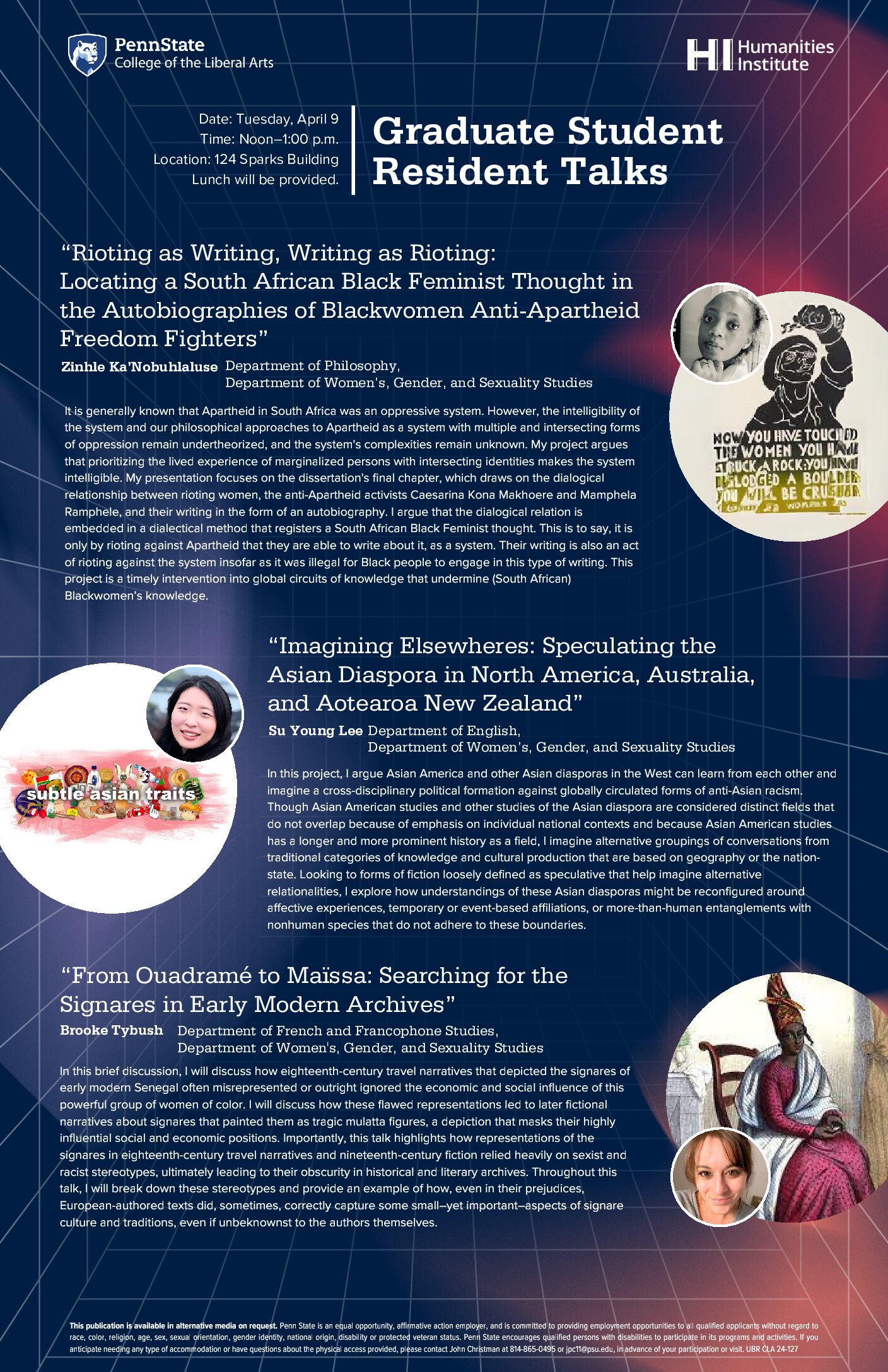Humanities Institute Graduate Student Talks, feat. Brooke Tybush
Lunch will be provided!
“Rioting as Writing, Writing as Rioting: Locating a South African Black Feminist Thought in the Autobiographies of Blackwomen Anti-Apartheid Freedom Fighters”
Zinhle K’Nobuhlaluse, Department of Philosophy; Department of Women’s, Gender, and Sexuality Studies
It is generally known that Apartheid in South Africa was an oppressive system. However, the intelligibility of the system and our philosophical approaches to Apartheid as a system with multiple and intersecting forms of oppression remain undertheorized, and the system’s complexities remain unknown. My project argues that prioritizing the lived experience of marginalized persons with intersecting identities makes the system intelligible. My presentation focuses on the dissertation’s final chapter, which draws on the dialogical relationship between rioting women, the anti-Apartheid activists Caesarina Kona Makhoere and Mamphela Ramphele, and their writing in the form of an autobiography. I argue that the dialogical relation is embedded in a dialectical method that registers a South African Black Feminist thought. This is to say, it is only by rioting against Apartheid that they are able to write about it, as a system. Their writing is also an act of rioting against the system insofar as it was illegal for Black people to engage in this type of writing. This project is a timely intervention into global circuits of knowledge that undermine (South African) Blackwomen’s knowledge.
“Imagining Elsewheres: Speculating the Asian Diaspora in North America, Australia, and Aotearoa New Zealand”
Su Young Lee, Department of English; Department of Women’s, Gender, and Sexuality Studies
In this project, I argue Asian America and other Asian diasporas in the West can learn from each other and imagine a cross-disciplinary political formation against globally circulated forms of anti-Asian racism. Though Asian American studies and other studies of the Asian diaspora are considered distinct fields that do not overlap because of emphasis on individual national contexts and because Asian American studies has a longer and more prominent history as a field, I imagine alternative groupings of conversations from traditional categories of knowledge and cultural production that are based on geography or the nationstate. Looking to forms of fiction loosely defined as speculative that help imagine alternative relationalities, I explore how understandings of these Asian diasporas might be reconfigured around affective experiences, temporary or event-based affiliations, or more-than-human entanglements with nonhuman species that do not adhere to these boundaries.
“From Ouadramé to Maïssa: Searching for the Signares in Early Modern Archives”
Brooke Tybush, Department of French and Francophone Studies; Department of Women’s, Gender, and Sexuality Studies
In this brief discussion, I will discuss how eighteenth-century travel narratives that depicted the signares of early modern Senegal often misrepresented or outright ignored the economic and social influence of this powerful group of women of color. I will discuss how these flawed representations led to later fictional narratives about signares that painted them as tragic mulatta figures, a depiction that masks their highly influential social and economic positions. Importantly, this talk highlights how representations of the signares in eighteenth-century travel narratives and nineteenth-century fiction relied heavily on sexist and racist stereotypes, ultimately leading to their obscurity in historical and literary archives. Throughout this talk, I will break down these stereotypes and provide an example of how, even in their prejudices, European-authored texts did, sometimes, correctly capture some small–yet important–aspects of signare culture and traditions, even if unbeknownst to the authors themselves.
